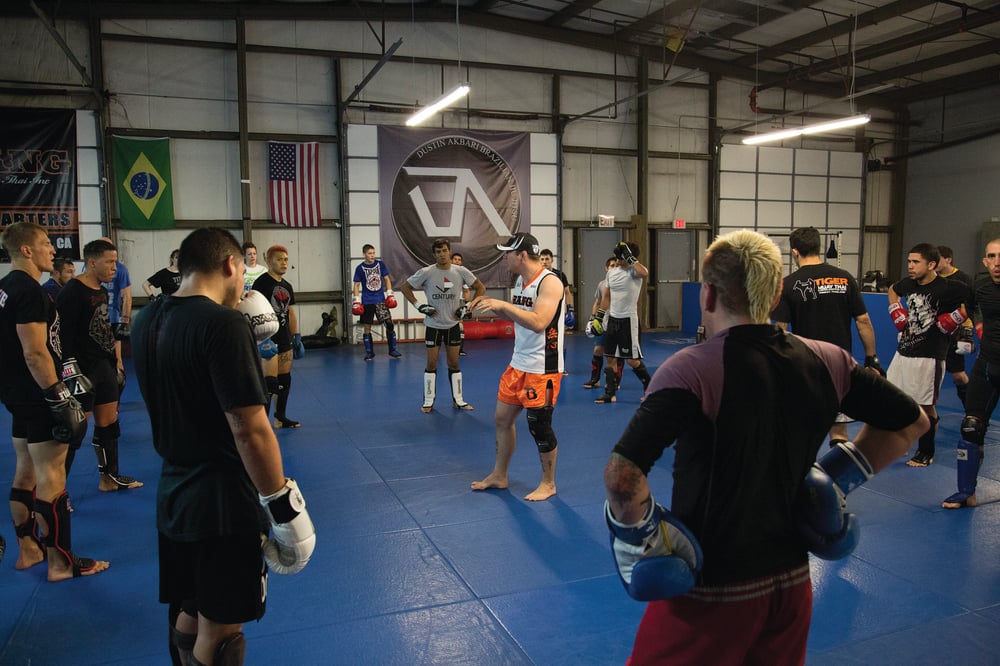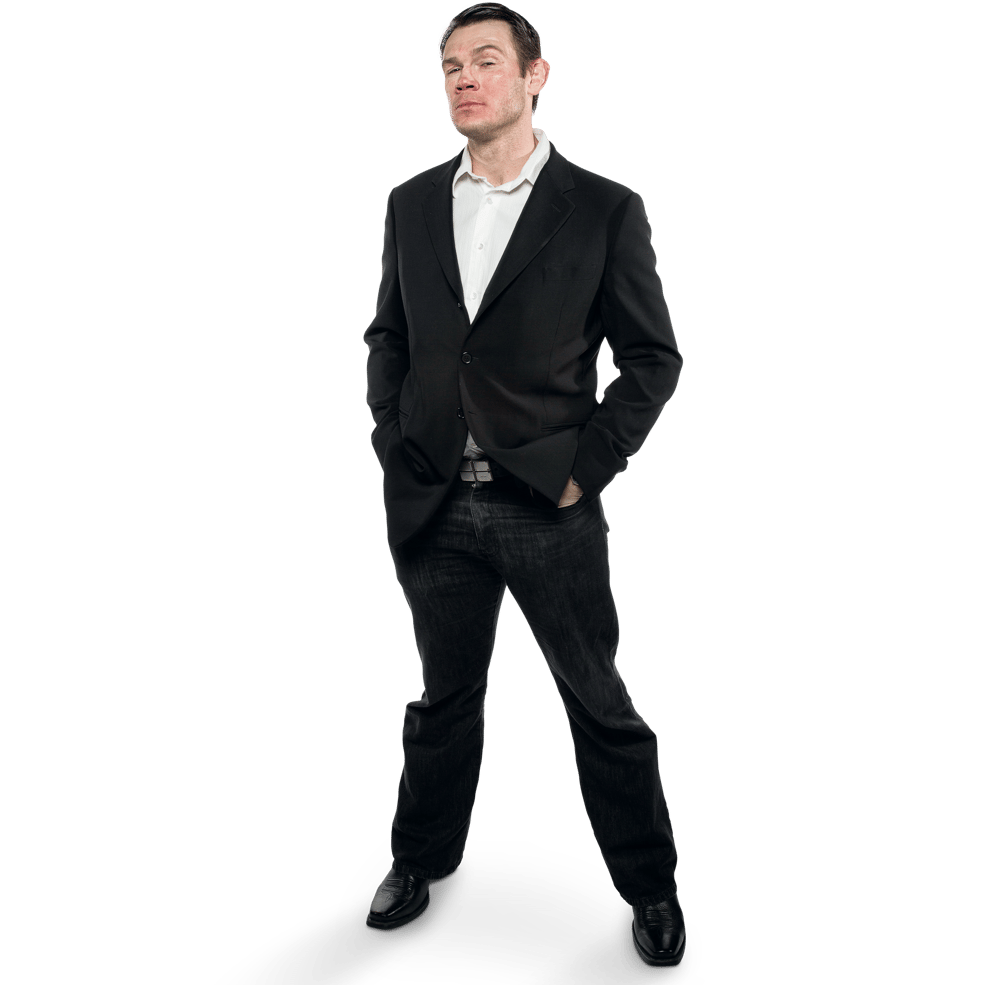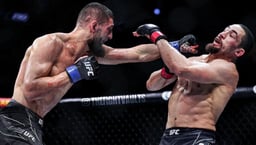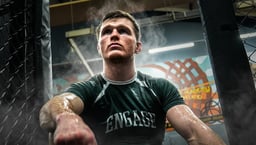
Issue 120
October 2014
From coaching the next generation, to analyzing MMA on TV and even being a traveling UFC salesmen; FO discovers how the life of a retired UFC star offers more opportunity than ever before.
Retirement. It’s a word that brings an aging fighter out in hives. It’s a word that instils panic and anxiety into even the youngest of competitors. A word that is the athletic equivalent of death.
Rarely will a fighter look forward to the end of his or her career. It is, after all, a moment usually triggered by an inability to do something that once came so easily, so naturally, and may also be motivated by a physical breakdown or a run of poor results. Rarely does it follow a great victory. Rarely are endings happy.
But, for Duane ‘Bang’ Ludwig, reigning Fighters Only World MMA Awards ‘Coach of the Year’, the climax of a 12-year professional fighting career couldn’t come soon enough. Rather than being happy with the ending – he lost the final three fights of his career inside a round – his retirement signaled the dawn of a new beginning. Now he could get on with what he truly wanted to do.
“During the last couple of years of my career I didn’t even want to fight,” says Ludwig, who is in the process of stepping down as head coach at Sacramento’s Team Alpha Male. “I just fought for the money. I wasn’t going after it the way I used to. In 2004, when I won my second world title, I was pretty much over fighting then. I set my goal to win the kickboxing world title and, once I did that, I was done.
“If I’d had the opportunity to stop fighting and train Team Alpha Male years ago, I’d have done it in a second. I think it’s good that I had those years of experience, but I shouldn’t have fought for as long as I did. Coaching was my true calling. I know that now.
“Now it’s all about what I can do for other people and I like it that way. I’m in a position to help others become better martial artists and that’s what makes me feel good. In return, I get paid, they take care of me and my family, I grow as a martial artist and I grow as a human being. I grow spiritually, emotionally and financially.”
The coach
In truth, Ludwig has been training Muay Thai fighters since the age of 19. Thus, with teaching a part of his psyche, the subsequent transition to full-time coaching ended up being relatively seamless. What’s more, the decision to stick around gyms and a fighting environment spared him that barren spell others encounter when calling it quits.
“I don’t live a normal life by any means,” he acknowledges. “I still live the life of a martial artist and I will do so for the rest of my life. Not much has changed other than the fact I now get to help people and not be selfish. I’m much happier as a martial arts instructor than I ever was as a fighter.”
When he speaks, Ludwig makes the idea of shifting from fighter to coach sound not only appealing, but utterly sensible. Recommended, even. Yet his endorsement comes with a cautionary warning.
“It is not for everybody,” he states. “It certainly takes a rare human being to do it at my level. Whether that’s boastful or not, it doesn’t matter. I know exactly what I’m doing. That doesn’t mean that other retired fighters shouldn’t do it, but you can’t tell me that every former fighter should be a coach or an instructor.
“I’ll tell you what, there’s a high percentage of coaches out there now that shouldn’t be coaching. They don’t know what they’re doing. Does that mean they shouldn’t be allowed to coach? I don’t know. It’s fine if they’re helping someone improve through exercise, I have no problem with that.
“But there are some coaches out there who are instructing good fighters, people who have their lives on the line every time they fight, and their information is bulls**t. I do not agree with that. It’s dangerous.”

When pressed to name an active fighter who might one day make the grade as a coach, Ludwig is quick to respond. “Mike Pyle would be good,” he states. “I’ve worked with him before and I’ve seen him work with people. He’s good around people and he’s great at breaking down drills and giving different information to different people. He’s adaptable.”
It’s rare that a fighter is ultimately defined by what they achieve in their so-called second career, but, in the case of Ludwig, this may well be true. Certainly, his sterling work with the pint-sized scrappers at Team Alpha Male suggests his legacy will be carved that way.
“I can make most human beings understand how to throw a combination, no matter their skill level,” Ludwig says. “That’s because I have the information, the patience and the experience.
“But, of course, it’s a dream for me to work with TJ Dillashaw, Chad Mendes, Joseph Benavidez, Danny Castillo, Andre Fili and Chris Holdsworth, because these guys are rare and exceptional martial artists.
“They pick up information very quickly and know how to act on it in a split-second. That makes it a bit easier for me, and I’m grateful to them for that. But, if one of them doesn’t pick something up, I have to be the one to adapt and teach them differently. It’s up to me. That’s why I coach TJ differently to how I coach Danny. They’re two different athletes.”
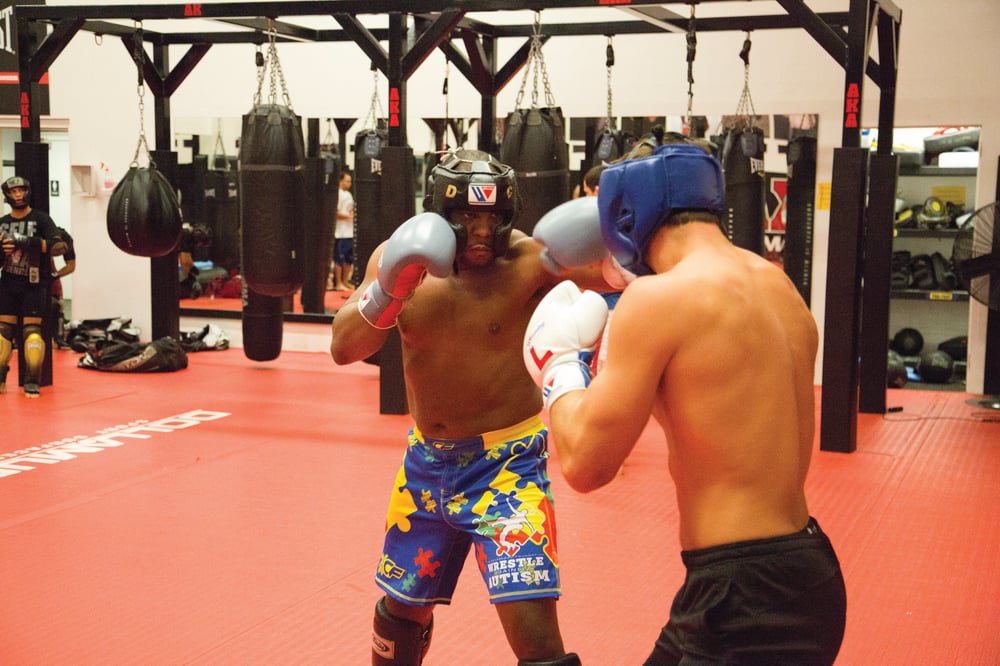
Ludwig’s crowning moment to date arrived in May when Dillashaw pitched a five-round clinic to snatch the UFC world bantamweight crown from a shell-shocked Renan Barao. It was a clever, calculated and clinical performance that owed plenty to Ludwig’s coaching.
But it also seemed to signal the end of Ludwig’s association with the dream team, as rumors circulated he was set to leave his position as head coach and seek pastures new in Colorado.
“I’m still coaching the guys,” he reveals. “I’m in Sacramento right now, in fact. I’ll just be going back and forth between Sacramento and Colorado, which is where I’ll be opening up my own academy. It’s not really a case of me leaving them. We will still all work together, and they will join me in going back and forth between the two places.
“I’ve found a good spot for the academy and we’re now going through the process of finalizing the details and playing the numbers game. I’m a martial artist going into the business world and it’s interesting to say the least.”
It behooves the rampaging Alpha Males to stick with a man voted 2013’s ‘Coach of the Year’. He’s doing something right.
“That’s the highest award in my field, so that’s cool,” Ludwig adds. “But I already knew I knew what I was doing. Now everybody else knows that I know what I’m doing too!
“It just elevated my stock and my status, and my business might improve off the back of it. It didn’t solidify anything with me, though. It just made me feel better that other people were starting to wake up.”
Duane Ludwig
- Fighter: 2000–2012 / 21-14
- Coach: 2013-present
Athletes with great coaching potential
- Anderson Silva
- Daniel Cormier
- Brad Pickett
The analyst
Welterweight Dan Hardy, one of the last men to beat Ludwig inside the Octagon, has marveled at the coaching work of his former foe, but admits a career in holding pads isn’t right for him at this moment in time.
“It’s been considered a few times,” says the Brit, “but the timing would have to be right. Right now I’m still learning and selfishly don’t have time to coach others.”
Instead, Hardy focuses on a fledgling career as a TV commentator, an avenue fighters have often explored in retirement. Yet to call time on his own fighting life, despite having not fought since September 2012, ‘The Outlaw’ is thriving in his new role.
“It was something I acknowledged early in my career. Whenever I would watch fights with friends, I would always have to talk them through the action. I also did some voiceover work for some smaller promotions looking to add fights to DVDs. I’d not thought about it as a job, though, until Dana White suggested it to me outside the UFC office in Vegas.”
While he’s sitting Octagon-side in smart clothes commenting on others, Hardy admits he’ll find it tough to retire. The temptation to hit the gym and prepare for a fight overwhelms him. His eyes flash green with envy.
“It does make me eager to fight again,” admits the 32-year-old. “The fulfillment isn’t the same. I do feel a sense of accomplishment afterwards, but not like a victory. It’s different. Sending someone to the canvas appeals to my reptilian brain and that’s the part of me that causes most of the problems.
“I see my foreseeable future consisting of commentating, among other things. The remainder of my fighting career will be brief, sporadic and exciting. That’s just for fun. Now I have a real job.”
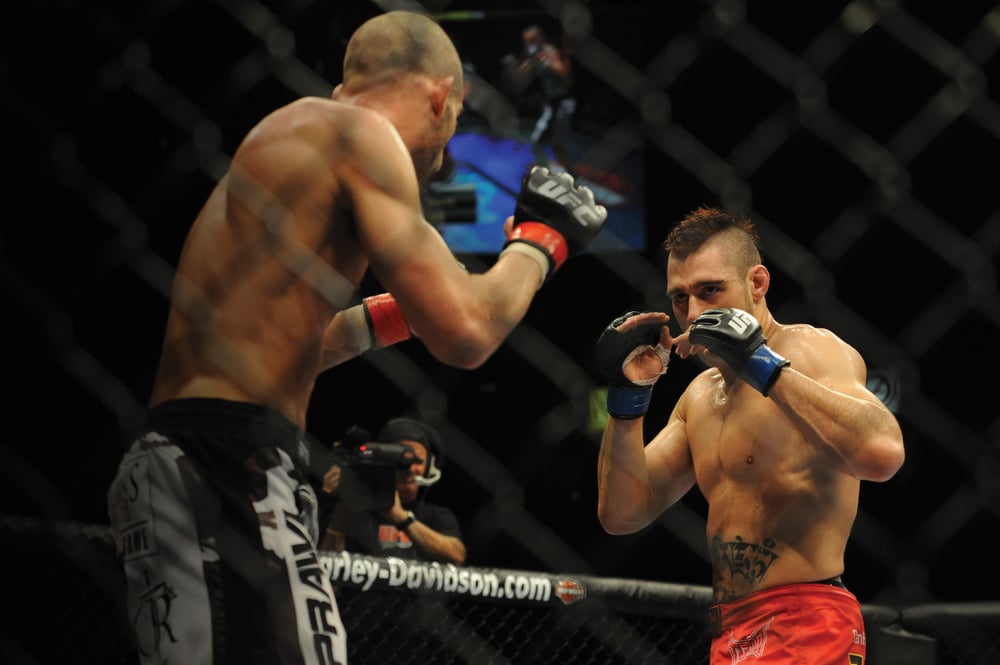
Real jobs are hard to come by in retirement, as many former fighters can attest. Credit to the likes of Fox Sports and the UFC, then, that active fighters such as Hardy and retired fighters like Kenny Florian and Brian Stann have been able to pursue commentary roles and explore avenues away from the Octagon.
“I love the job they have given me and I’m extremely grateful,” says Stann. “Every job I’ve ever had has been a hard-woking, blue collar-esque job, and to get the opportunity to earn money doing something you enjoy is truly a blessing.
“Ultimately, I’m talking about something I am passionate about and talking about men for whom I have the utmost respect. I like and admire all of the fighters I speak about and, in many cases, have built bonds and friendships with them.”
Former lightweight contender Florian adds: “I’ve always loved the sport and enjoyed talking about it. I often dreamed that I could commentate one day, but it didn’t really become a realistic goal until Joe Silva, the UFC matchmaker, suggested I try it at The Ultimate Fighter Finale main event between Roger Huerta and Clay Guida. So I did.
“I sat in as the third man in the booth with Joe Rogan and Mike Goldberg. It was fun from day one.”
Stann’s breakthrough moment, meanwhile, arrived at UFC 163 last year, when the former light heavyweight contender was asked to take over color commentary duties from Rogan in Rio De Janeiro, Brazil. Rogan, beloved by the fans, had only missed two of the previous 100 pay-per-view events, so Stann, recently retired, had every right to feel under pressure.
“I’ve been part of many genuinely nerve-wracking situations in my life and, when you stack them all up, appearing on television to talk about something I love doesn’t rank very high up there,” says the former US Marine.
“Believe me, if they were asking me to go on live television and break down how an iPad works, you’d probably see me nervous and in a world of trouble, but that’s not what this job entails. I’m talking about fighting and it’s not particularly complicated. Really, it’s a dream job for any fighter and fan out there, and I consider myself both a fighter and fan of this sport.”
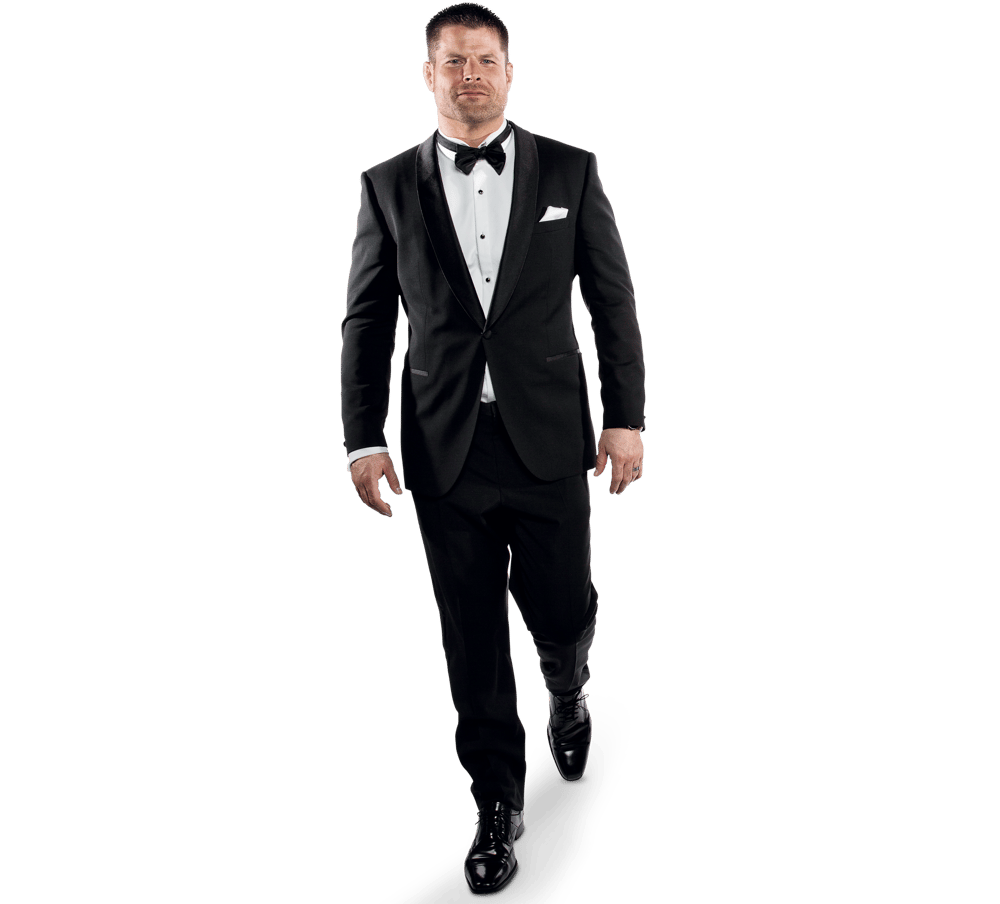
Perhaps the greatest upside to all this is that it can lead to a new career when one has just evaporated. Moreover, these jobs in media – whether as a commentator, interviewer or analyst – help provide retired fighters with fresh ambitions, targets and an all-important routine, somet hing many struggle with when finally hanging up the gloves.
“I love what I do and I want to continue to improve,” adds Florian. “I always go back and watch my commentary and critique my work. I have worked with a voice coach as well, and am forever open to hearing feedback from producers.
“There is certainly a lot of preparation that goes into commentary, especially when you consider that the UFC has a 500-plus roster right now. As a result, I’m always watching fights, analyzing them, researching stats and talking to fighters, coaches and UFC matchmakers. It requires a lot of work these days.”
The great plan, it would seem, is for these men to eventually become defined not only by their considerable fighting achievements, but also their capabilities on the safer side of the Octagon. Then, and only then, will they be able to let the memories and scars of competition fade.
Dan Hardy
- Fighter: 2004–present / 25-10 (1 NC)
- Analyst: 2014–present
Loose-lipped, made-for-TV future analysts
- Ronda Rousey
- Conor McGregor
- Clay Guida
The salesman
Forrest Griffin, the retired former light-heavyweight champion, has yet to follow Ludwig into coaching or even follow the likes of Stann and Florian into media work, but has fully embraced his role as a UFC ambassador and often travels from event to event spreading the word.
“I’m a salesman and I’m selling something that I love, that I did and that I know about,” Forrest explains with his trademark grin. “It’s easy to sell something you love. I couldn’t sell a car, or something other than fighting.
“I’d be a horrible salesman in the real world. I’d be too honest. I’d say, ‘Well, this alarm system’s good, but it’s not great,’ or, ‘The car’s really fast, but it’s going to be expensive to insure if you get in a wreck.’ ‘You don’t want this car. It’s going to depreciate.’ I’m too much of a realist.
“And I’m even too much of a realist when I talk to guys who want to be professional fighters. I’ll say, ‘Well, that’s great, it will be the most fun you ever do. But it likely won’t be the last thing you ever do.’”
Forrest Griffin
- Fighter: 2001–2012 / 19-7
Three prospective UFC ambassadors
- BJ Penn
- Frank mir
- Rashad Evans



